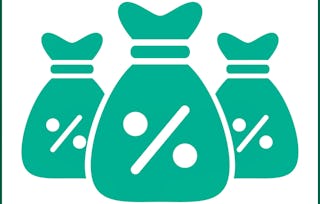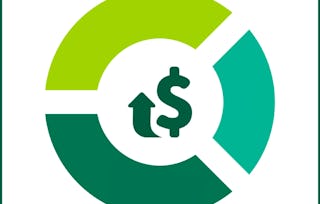The traditional approach to pricing based on costs works to pay the bills, but it leaves revenue on the table. You can, in fact, price your products in a way that increases sales--if you know what your customers are willing to pay and can leverage psychology to create better deal and discount plans. In this course, we'll show you how to price a product based on how your customers value it and the psychology behind their purchase decisions. Developed at the Darden School of Business at the University of Virginia, and led by top-ranked Darden faculty and Boston Consulting Group global pricing experts, this course provides an in-depth understanding of value-based pricing and how to use it to capture more revenue.


Gain next-level skills with Coursera Plus for $199 (regularly $399). Save now.


Customer Value in Pricing Strategy
This course is part of Pricing Strategy Optimization Specialization



Instructors: Jean Manuel Izaret
19,654 already enrolled
Included with
(373 reviews)
Recommended experience
What you'll learn
Customer value applications in pricing products
How to leverage core value-based pricing techniques to inform pricing decisions
How to measure customer willingness to pay using models (surveys, conjoint analysis, other data)
Consumer psychology applications in setting prices beneficial to both consumers and sellers
Skills you'll gain
Details to know

Add to your LinkedIn profile
See how employees at top companies are mastering in-demand skills

Build your subject-matter expertise
- Learn new concepts from industry experts
- Gain a foundational understanding of a subject or tool
- Develop job-relevant skills with hands-on projects
- Earn a shareable career certificate

There are 4 modules in this course
Welcome to Week 1! We kick off the week with an overview of the course so that you'll know what to expect with an optional review of the specialization and three pricing lenses (watch these if you want a refresher). Then we'll dive into the content! This week, you'll learn about customer value--what it is and its relevance to pricing. You'll see how consumers make decisions--and why knowing consumers' willingness to pay is so important when setting a product's price. Next, we'll take a look at customer value in developing economies and how and why companies succeed (or not!) with value-based pricing in these markets. You'll finish the week with a solid understanding of "customer value" and how that impacts pricing strategy.
What's included
13 videos3 readings3 assignments3 discussion prompts
Now that you have an understanding of customer value, let's dive into value-based pricing in greater depth. This week, we'll show you how to price to the demand curve using three tools: the price piano, the price ladder, and incentive curves. We'll take a look at customer value drivers in a B2B context and walk through a process to price a new product. Then Ron and Thomas will show you how price elasticity plays into value-based pricing. Implementing value-based pricing requires detailed analysis. Let's get started!
What's included
11 videos4 assignments
As you learned in Week 1, understanding customer willingness to pay (WTP) is critical for effective pricing. This week, we'll show you two ways to measure willingness to pay: surveys and conjoint analysis. You'll see how one company, Adios Junk Mail, used surveys to better understand WTP. Conjoint is a terrific tool, and we'll walk you through how it's used to determine product preferences and prices. You'll finish the week with a solid understanding of how to measure customer preferences and use this information in your pricing strategy.
What's included
15 videos1 reading4 assignments
Last week you considered pricing using a rational utility model. But humans are not always rational beings--and your pricing strategy needs to consider other behavioral drivers. We'll look at the psychology behind consumer purchase decisions and the mental accounting that impacts those decisions. Next we'll consider consumer price perceptions and ways to frame prices and create better deals and discount plans that work for both the consumer and the seller. Then, we'll take a look at two real-world cases, the Portland Trailblazers and Fidelity Investments so that you can practice using tools from throughout the course in a real-world case. You'll finish the course with fresh insights into value-based pricing and its applications.
What's included
15 videos1 reading4 assignments1 peer review
Earn a career certificate
Add this credential to your LinkedIn profile, resume, or CV. Share it on social media and in your performance review.
Explore more from Marketing
 Status: Free Trial
Status: Free TrialUniversity of Virginia
 Status: Free Trial
Status: Free TrialIE Business School
 Status: Free Trial
Status: Free TrialUniversity of Virginia
 Status: Free Trial
Status: Free TrialUniversity of Virginia
Why people choose Coursera for their career




Learner reviews
373 reviews
- 5 stars
84.71%
- 4 stars
13.13%
- 3 stars
0.80%
- 2 stars
0.53%
- 1 star
0.80%
Showing 3 of 373
Reviewed on Jul 10, 2019
Lot of insights about custmers and how to play with this information to price according to their willingness to pay
Reviewed on Mar 17, 2020
This is the best course by far in the specialization. A lot of new things for me to learn. Absolutely loved it.
Reviewed on Aug 3, 2023
Great learning with practical and thought provoking assignments!
Frequently asked questions
To access the course materials, assignments and to earn a Certificate, you will need to purchase the Certificate experience when you enroll in a course. You can try a Free Trial instead, or apply for Financial Aid. The course may offer 'Full Course, No Certificate' instead. This option lets you see all course materials, submit required assessments, and get a final grade. This also means that you will not be able to purchase a Certificate experience.
When you enroll in the course, you get access to all of the courses in the Specialization, and you earn a certificate when you complete the work. Your electronic Certificate will be added to your Accomplishments page - from there, you can print your Certificate or add it to your LinkedIn profile.
Yes. In select learning programs, you can apply for financial aid or a scholarship if you can’t afford the enrollment fee. If fin aid or scholarship is available for your learning program selection, you’ll find a link to apply on the description page.
More questions
Financial aid available,
¹ Some assignments in this course are AI-graded. For these assignments, your data will be used in accordance with Coursera's Privacy Notice.







